

U.S. President Donald Trump is set to authorize a new package of weapons transfers to Ukraine—his first such move since taking office—using his Presidential Drawdown Authority (PDA).
According to a report by Reuters, Trump will approve a transfer of approximately $300 million worth of weapons, including Patriot air defense missiles and various short- to medium-range rocket systems. This marks a shift in the administration’s Ukraine policy, as all previous shipments under Trump had been approved during the tenure of former President Joe Biden. The last such package, valued at $500 million, was approved on January 9th, shortly before Trump returned to office.
Currently, $3.86 billion remains available for Ukraine under the PDA, out of the $7.8 billion approved by Congress in April 2024.
The announcement follows a pause in shipments of several key weapons systems last month, including Patriot missiles, artillery shells, and air-to-air missiles intended for Ukraine’s Western-supplied F-16 fighter jets. The Trump administration cited critical shortages in U.S. stockpiles as the reason for the halt.
However, Trump appeared to reverse course during a meeting with Israeli Prime Minister Benjamin Netanyahu on Monday. Speaking to reporters, he stated, “We’re going to send some more weapons. We have to. They have to be able to defend themselves. They’re getting hit very hard now.”
The move could carry political risks. Trump previously campaigned on ending the war in Ukraine within 24 hours and has repeatedly distanced himself from the conflict, calling it “Joe Biden’s war.” Many within Trump’s voter base remain opposed to continued military support for Ukraine. Now that he is personally using PDA to approve weapons transfers, critics argue he may no longer be able to avoid responsibility for U.S. involvement in the conflict.
On Thursday, Secretary of State Marco Rubio met with Russian Foreign Minister Sergey Lavrov in Malaysia, the first high-level diplomatic meeting between the two countries since March. The Trump administration continues to pursue a negotiated freeze to the war, though Moscow has reiterated that any resolution must include key concessions from Kiev.